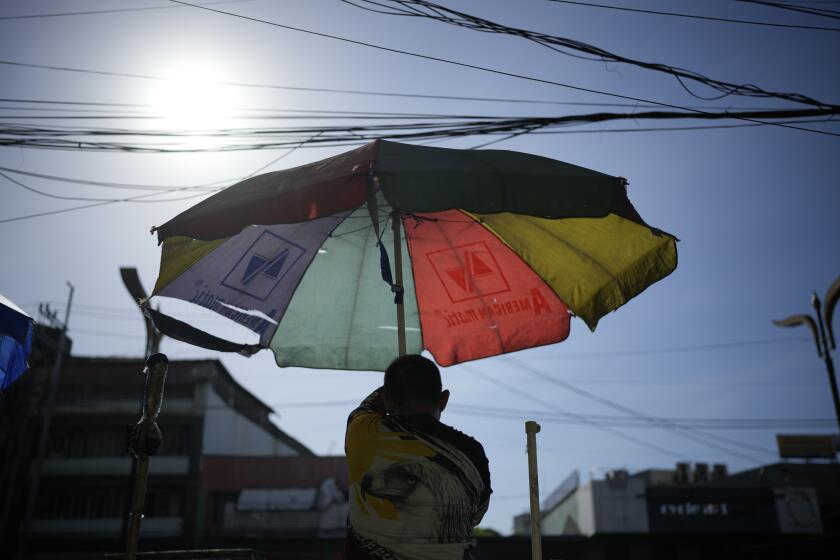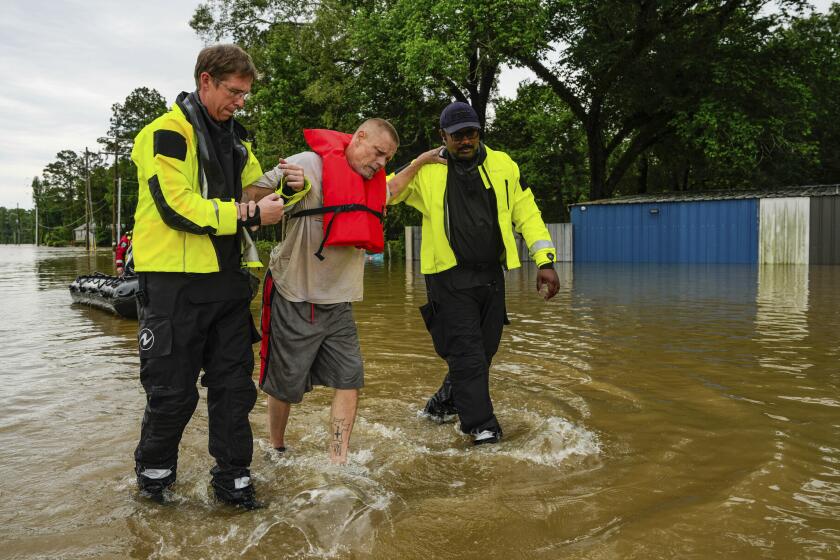Verdict Ends Sad Time for Marines : But Nagging Questions Remain After Lonetree Conviction
As the balmy summer midnight approached, a young corporal on guard duty at this Marine base in the wooded hills of northern Virginia paused to contemplate the espionage conviction meted out a few hours earlier to Sgt. Clayton J. Lonetree.
“It doesn’t erase the black mark, sir,” he tersely told a reporter, “but at least it’s over, and now we can move on.”
For the first time in the Marines’ 212-year history, one of their own had been found guilty of selling secrets to the enemy. The military jury of eight officers returned the verdict Friday night in the case of the former Marine security guard at the U.S. Embassy in Moscow: guilty on all 13 counts of espionage, conspiracy and larceny.
To some Marines, the monthlong court-martial of Lonetree had been like excising an ugly sore--necessary, perhaps, but still excruciatingly painful. One of the “best of the finest,” a member of the elite unit assigned to protect America’s most sensitive diplomatic installations abroad, had become “a real-life Benedict Arnold,” the prosecutor said, had betrayed his country for “money, intrigue, sex, ego, ideology. . . .”
Could Get Life Term
Lonetree is to be sentenced today. He could face a maximum punishment of life imprisonment. His lawyer, William M. Kunstler, said he would appeal. “Marine Corps justice failed him,” the attorney said of the 25-year-old Lonetree. “. . . Corps pride, corps pressure had a lot to do with this verdict.”
After Lonetree’s conviction, as they had before and during the court-martial, the corps’ leadership maintained strict silence on the scandal. Now many Marines, from the generals at the Pentagon to the corporal on lonely duty late Friday night at Quantico, are ready to move on, to put the anger and embarrassment behind them, to turn away from what one military analyst called “the darkest day for the Marine Corps.”
As the Lonetree court-martial ended, though, nagging questions remained, not only about the Marine Corps’ role as protector of embassy secrets but also about diplomatic security and intelligence operations abroad.
Some members of Congress remain concerned, as House Armed Services Committee Chairman Les Aspin (D-Wis.) said before Lonetree’s trial, “about the use of young Marines in sensitive locations.”
Guard System Defended
Marine officers bristle at suggestions that “rent-a-cops” be brought in to replace the young men in dress blues who, for 38 years, have guarded more than 100 U.S. embassies abroad--with an unblemished record, until the Moscow scandal.
These officers say that the selection and training of embassy guards has been improved, tours of duty at hardship posts such as Moscow have been shortened, and the chain of command of the widely scattered units has been tightened--officers, rather than senior enlisted men, are being put in charge of guard units at key embassies.
Pentagon and State Department reviews this spring also brought recommendations for tightening security, such as by random use of polygraph tests on embassy guards and security personnel. Representatives of the State Department and CIA closely monitored the Lonetree court-martial. While journalists had to watch the proceedings on closed-circuit television in another building--Marine Corps officials said the courtroom was too small to allow them inside--officials of the two agencies were reported to be in the courtroom every day.
Sources said that the State Department and CIA officials remained in attendance when the proceedings went into closed session to deal with classified information or national security issues. During these times--which were frequent and came even during closing arguments--the television monitors for the media were blacked out.
Anonymous Witnesses
Some witnesses were never fully identified. These included “Big John” and “Little John,” the CIA agents who interrogated Lonetree after he volunteered to the CIA station chief in Vienna that he had remained in contact with Soviet citizens after he was transferred from Moscow to the Vienna embassy.
Much of the State Department and CIA interest was said to center on any revelations about “Uncle Sasha,” the KGB operative who met with Lonetree in Moscow and Vienna a dozen times.
Lonetree was introduced to Uncle Sasha by Violetta Sanni, an attractive Soviet woman who had worked at the U.S. Embassy as a translator and with whom he had a sexual relationship.
In the formal complaint lodged against Lonetree last spring, prosecutors said that Sasha actually was Alexei Yefimov, a KGB operative, but provided no further identification. Sources said that Lonetree had picked out Yefimov’s picture when, during two weeks of interrogation last December, he was shown photographs of “possible Sashas.”
Late in the Lonetree trial came testimony that political officers at the embassy considered Yefimov a “very sharp” back-channel contact. One diplomat testified he had met regularly with Yefimov, who he said claimed to be an official of the State Committee for Science and Technology. Information provided by Yefimov was regularly passed on to Washington, the diplomat said.
The State Department reportedly had serious misgivings about revealing the back-channel diplomatic contacts with Yefimov, but concluded that it was necessary to do so to avoid allegations that it was covering information that might be crucial to Lonetree’s case.
Diplomatic and intelligence sources said that Yefimov’s apparent dual role remains a puzzle. If Yefimov was in fact Uncle Sasha and the handler of Lonetree while at the same time he was in contact with other embassy officials, these sources said, then the Soviets violated one of the cardinal rules of intelligence: Covert operations must be compartmentalized; no single operative should be involved in more than one operation.
“It’s a riddle we may never have the answer to,” one source said.
More to Read
Start your day right
Sign up for Essential California for news, features and recommendations from the L.A. Times and beyond in your inbox six days a week.
You may occasionally receive promotional content from the Los Angeles Times.






